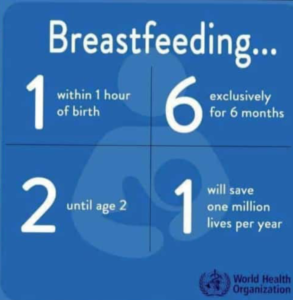By Namwanje Maria Antonia
Breastfeeding is one of the most effective ways to ensure child health and survival. Breastmilk is the ideal food for infants that should be initiated within the first one hour of birth. It is safe, clean, nutritionally-rich and contains antibodies which help protect against many common childhood illnesses.

Nutritional requirements are highest for infants due to increased growth rate. They usually double their birth weight by six months and triple their birth weight by one year. Breastmilk provides all the energy and nutrients that the infant needs for the first months of life, and it continues to provide up to half or more of a child’s nutritional needs during the second half of the first year, and up to one third during the second year of life.
The World Health Organization recommends that wherever possible, all infants should be exclusively breastfed for the first six months and breastfeeding should continue for up to two years or beyond.
Every mother has the capacity to produce breastmilk for their baby once given the right emotional and nutritional support. The amount of breastmilk a mother is able to produce has nothing to do with the breast size. A mother with small breasts can have just as much or more milk-making tissue as a mother with large breasts.
Breastfeeding is important to both the mother and the baby in the following ways;
To the mother
- It reduces postpartum bleeding.
- It brings about more rapid contraction of the uterus.
- It contributes to lactation amenorrhea so as to reserve iron stores.
- It reduces the risk of ovarian and breast cancer.
- It reduces the risk of osteoporosis during the postmenopausal phase.
- It reduces the weight of the mother after birth.
To the baby
- The first milk after birth known as colostrum contains antibodies which confer a protective effect against infections such as bacterial meningitis, bacteremia, gastroenteritis, enterocolitis, otitis media and others.
- Exclusive breastfeeding brings the greatest benefits for low-birth weight or pre-term babies as it dramatically improves their survival.
- Breastmilk contains fatty acids and monoglycerides that penetrate the cell membranes of bacteria and viruses that invade the baby’s body.
- There is a reduced risk of developing chronic disorders in later stages of life such as diabetes, hypercholesterolemia and obesity.
- Breastmilk improves the neurological and cognitive development.
- It reduces the risk of allergies and lactose intolerance.
- Breastmilk prevents constipation as it is easily digested.
- It contains hormones, growth promoting hormones, cytokines, prostaglandins that protect the body against infections.
- It has a low renal solute load thus reduces the risk of overconcentrating.
- It enhances bond creation between the mother and the baby.
Health care professionals can educate mothers about proper attachment of the baby to the breast as it is an important factor for breast milk flow.
Fathers can take part in house chores to allow enough time for the mothers to breastfeed their babies. They can offer emotional support to the mothers as this stimulates sufficient breast milk production.
The writer is a Fourth Year Student – Bachelor of Science In Human Nutrition And Dieteics- Kyambogo University.
























